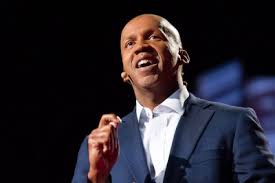This year, Connecticut College partnered with One Book One Region, a community based initiative that began as small book club and developed into a larger program for the communities of Eastern Connecticut. One Book One Region strives to break down barriers between community members through discussion and an appreciation for reading. This year, the club elected to read “Just Mercy: A Story of Justice and Redemption” by Bryan Stevenson. As part of Conn’s partnership with the program, Stevenson will visit the College on April 4.
In keeping with the theme of justice, members of the Connecticut College and New London community gathered on February 3, to listen to a talk by Scott Lewis. Lewis was incarcerated for 19 years for a crime he did not commit and has written a book about his experiences titled “The Long Hard Road for Justice”. At age 25, Lewis arrested for the double murder of a former New Haven alderman and his roommate.
Police misconduct played a significant role in Lewis’s conviction. When he was arrested, the police never questioned Lewis on his whereabouts on the night of the murder. “They didn’t care where I was, they were putting me somewhere,” Lewis stated. In fact, Lewis was given no information about the case until he was able to post his bail nearly four weeks after the initial arrest.
The police misconduct continued beyond ignoring routine procedure. The detectives used questionable interview tactics to influence another man to make a false confession that incriminated Lewis. In past cases, the United States Supreme Court has defended the right of police officers to lie and use deception when interviewing suspects. Lewis disagrees with this method, suggesting that when you lie to someone, chances are they’re going to lie right back.
During the trial, evidence that would have likely prevented Lewis’s conviction was deemed inadmissible in court. Another man had essentially confessed to the murders, yet the jury was not given this information. “The rules of evidence are not necessarily used to get to the truth,” Lewis explained, going on to advise his audience, “whatever you do in your life, make sure you have all the information before you make a decision.”
The criminal justice system’s foundation relies on the principle of “innocent until proven guilty,” yet many have found the opposite to be true. Most people believe a defense attorney will do anything to get his client off, but in reality, the prosecution will do anything for a conviction. Lewis says this can be seen by the 1,733 exonerations that have been recorded by the Innocence Project.
Lewis remained steadfast in his innocence, refusing to take a plea bargain or admit any guilt for the crime in which he had no part. Because of this, he found himself unable to work with any lawyers, and instead decided to represent himself. For the majority of his nineteen years behind bars, Lewis educated himself on the law and continued to submit for appeals. Each unsuccessful attempt to prove his innocence did not discourage him, but only furthered his determination.
Once his case reached a federal level, Lewis finally resigned to the fact that he may need more assistance in the fight for his freedom. The Innocence Project of Connecticut and Yale Law School took up his case, yet Lewis remained adamant that they were working with him, not just for him. With the assistance of 50 Yale Law students, Lewis finally won his case.
When asked how he survived his time in prison, Lewis reflected on a statement death row inmate had made to him. “He told me his body was in prison but his mind was somewhere else” Lewis said, agreeing that this was how he and many others handled the isolation of incarceration. He also focused on improving himself, “[I told myself] I got to a better person today than I was yesterday. That’s how I got through”.
Today, Scott Lewis works for the Connecticut chapter of the Innocence Project, using his experience and knowledge of the law (he earned his diploma in paralegal studies while in prison) to help others who have been erroneously convicted. Lewis, like many others, acknowledges the need for a comprehensive criminal justice reform. Additionally, throughout his talk, he maintained the importance of standing up for oneself. “[The system] worked, because I worked it,” Lewis concluded with a smile.










